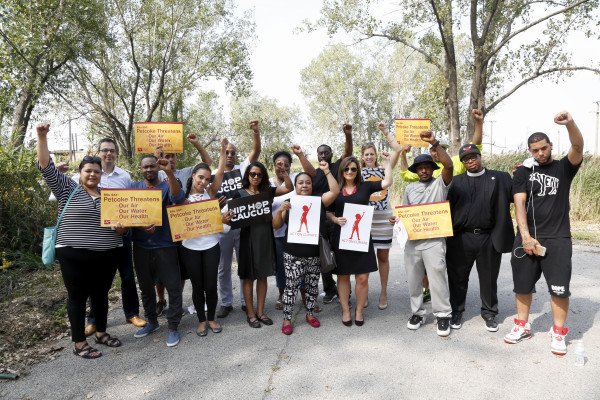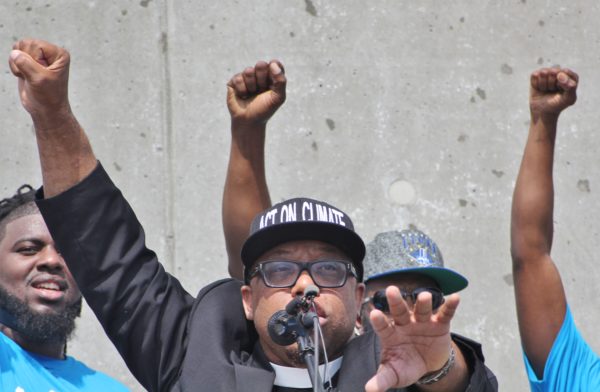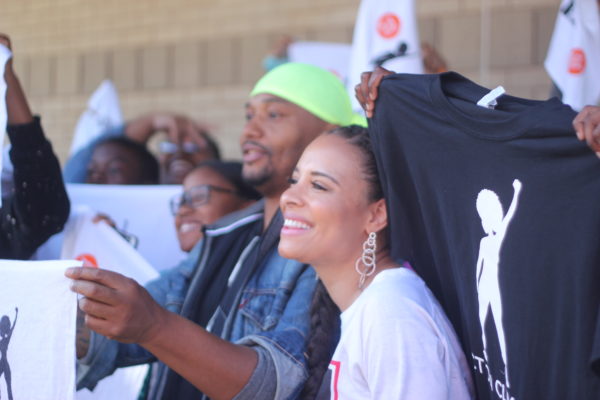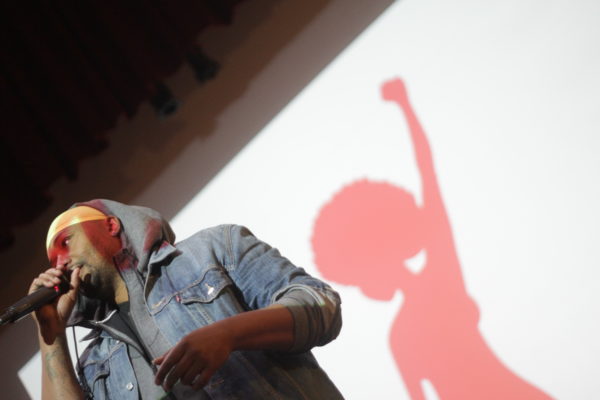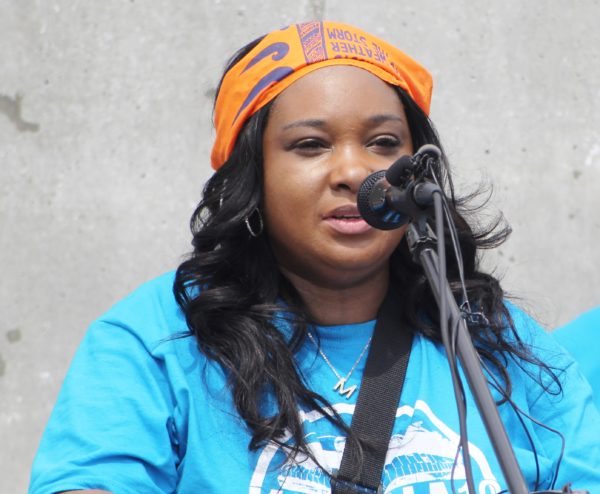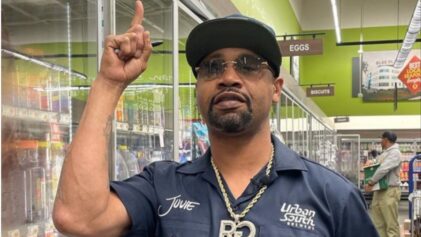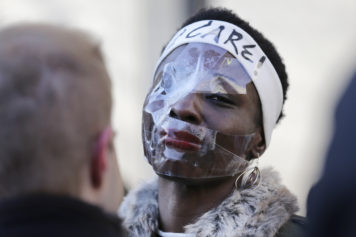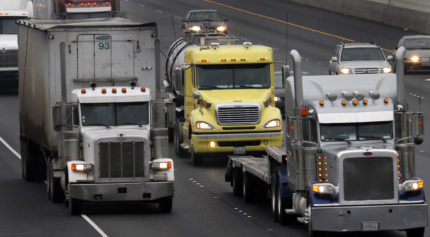A group of artists and activists have been taking the discussion of climate change and pollution in communities of color on the road. While climate change has become a key campaign issue for 2016, little of the conversation is focused on how climate, natural disasters and emissions affect poor and minority neighborhoods, who suffer the most.
The People’s Climate Music “Act On Climate” National Bus Tour is making sure these communities are not only informed, but also that they are not forgotten. Reverend Lennox Yearwood, Jr., president and CEO of the Hip Hop Caucus, is one of the tour’s organizers. He describes this as only a part of a larger movement for environmental justice.
“We saw how [in the 1980s] artists in the Sun City movement used music and artistic expression to get corporations to divest in apartheid in South Africa,” he says. “This is the same idea… we are using our cultural expression to shape our political experience. The only way to get to climate justice is through social justice [to include] divesting in fossil fuels.”
Rev. Yearwood says that investing in renewable energy does not have to be expensive and provides a unique opportunity for entrepreneurship in poor and communities of color.
“We view poverty and pollution as the same thing,” he says. “So many of our communities, about 58 percent, are within 30 miles of power plants. We are the ones who are most affected, we can take control, stop the building of power plants in our neighborhoods, learn about new technological resources in energy and become entrepreneurs.”
Yearwood notes that HBCUs can play a significant part in the training and investment in these communities. They can be leaders in this movement and bring forth awareness much like they did in the movement to end apartheid.
“Too many times [grantors] are bypassing HBCUs for grants and other sources of funding on environmental technology that could help our communities the most,” he says. “HBCUs could become more vocal in urging corporations to divest in fossil fuels and compete for the technology grants to train the community.”
Antonique Smith, a Grammy-nominated singer known for her portrayal of Faith Evans in 2008’s Notorious, is one of the artists featured on the tour. Smith also contributed to the 2014 album, HOME, a collection of songs that focuses on bringing attention to climate change and pollution in communities of color. Other artists featured on the album include Common, Ne-Yo and Elle Varner. Smith covered Marvin Gaye’s 1971 classic, Mercy Mercy Me (The Ecology) for the project. Although the song was one chosen for her, Smith was amazed at how relevant the song still is today.
“I always knew the song, but never really listened to the words,” she says. “When he says, ‘oil wasted on the ocean and upon our seas fish full of mercury’ and ‘radiation underground,’ to talk about it 40 years ago is just amazing. Marvin was a prophet because it is worse now than when he wrote it. Those were such informed statements.”
Smith, who grew up in East Orange, New Jersey around power plants and pollution, says this is a very personal and specific problem to poor black communities. Her concern is that politicians talk about long-term effects of climate and pollution without realizing that people are affected and hurting presently.
“It’s not something that is going to happen in the future,” she says, “it’s happening today and it’s affecting us all.”
After the tour, Smith plans to continue to be involved in the movement.
“I’ve always been an activist from early on when I wanted my school to observe Martin Luther King Day,” she says. “I fight for people who are under attack. I was planning to tour to promote my new single anyway, so when Rev. Yearwood came and asked it was perfect timing to talk about issues. This has been a blessing to me. I got to meet people and hear their stories, like in Chicago where a neighborhood has people there in a bad way with leukemia and blood disorders because of the pollution being dumped right there in people’s backyards. I will continue to visit communities of color, Black communities and even in regular conversation, just share with people this issue. This tour won’t be the end. I hope to record some more songs about this issue as well and just continue to elevate people around the country.”
Malik Yusuf is a five-time Grammy award-winning producer and poet. Yusuf produced HOME and is also on tour with Act On Climate. When it came to producing an album that related to environmental justice, he says that he was inspired by the music of the 1960s and 1970s.
“A lot of those songs are about the common person versus the corporation, the words were so vivid,” he says. “I researched all those songs, where they came from and modernized them.”
Yusuf met Rev. Yearwood through Russell Simmons’ Hip Hop Summit Action Network. According to Yusuf, the tour is just a small part of a much larger movement.
“When all’s said and done, we have created an organizational infrastructure,” he says. “[The tour] is only a small component, a minor measure of what we do in a day on this.”
Also on the tour is New Orleans native, Mia X, the first female emcee signed to Master P’s No Limit Records. Mia X is also a survivor of 2005’s Hurricane Katrina and has witnessed first-hand the devastation of climate, particularly natural disasters, on poor Black and brown communities.
“Many [who survived Katrina] are suffering respiratory illnesses from having lived in FEMA trailers for months that had sheetrock made with formaldehyde,” she says. “Then after Katrina was the BP oil spill in 2010. We depend on the Delta for food, seafood is very big there. Every few months we have a water boiling advisory. Our children [during Katrina] were living with polluted water for five days. It’s like everywhere we turn, we are being poisoned. We can’t say it’s hereditary when we’re living in FEMA trailers that are poisonous.”
Despite what many report, FEMA funds have not been distributed equally among Katrina survivors to rebuild. Black-owned businesses were shut out of the rebuilding efforts in areas like the lower ninth ward.
“In my area people didn’t see any money,” Mia X says. “Businesses closed down, my business closed. They haven’t really touched the people, the grassroots. [Katrina] hit us hard. New Orleans is still not complete. The city s so vulnerable, we can’t take too many more hits.”
Having met Rev. Yearwood just after Katrina, Mia found he had a genuine interest in what happened to the poorer neighborhoods that still haven’t recovered. She’s been working with him for the past 10 years to spread awareness. However, she realizes that there needs to be a coalition giving voice to these concerns.
“I want people to be more assertive about speaking out,” she says. “We need the politicians to know that we are the heartbeat of our cities. We are the cooks, the drivers, the workers. We are sick of being treated less than fairly. We can be proactive, but if a company comes and wants to build in our neighborhoods and poison us, we need the human race to step up.”
In the end, Rev. Yearwood says that one of the most important parts of any social justice movement is to shape policy, therefore, voting is a key component.
“We continue to encourage people to register to vote because either you shape policy or policy will shape you,” he says. “Through our campaigns, Vote Or Die, Hip Hop Votes, Act On Climate, we plan on informing people. This tour is leading up to the COP 21 [Conference of the Parties] summit in Paris. We plan on using this as a platform to ask them to stand with us, you are either for the people or for your pockets.”
The Act On Climate bus tour will continue through the end of September with stops in the following cities::
- Washington, D.C. – Sept. 16-18
- Brooklyn, N.Y. – Sept. 19-20
- New York – Sept. 21
- Baltimore, Md. – Sept. 21-22
- Washington, D.C. – Sept. 23-24
- Tempe, Ariz. – Sept. 26-2
The 2014 album, HOME, which features Antonique Smith’s rendition of “Mercy Mercy Me (The Ecology)” is available for purchase at www.itunes.com/HOME or http://peoplesclimatemusic.com.
